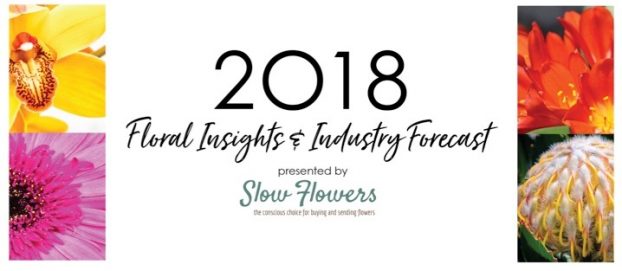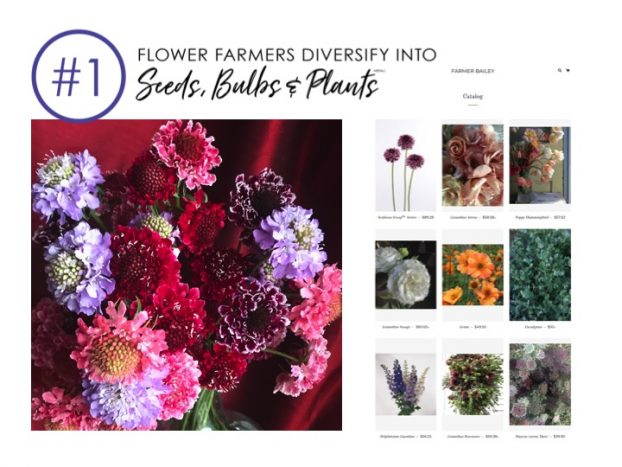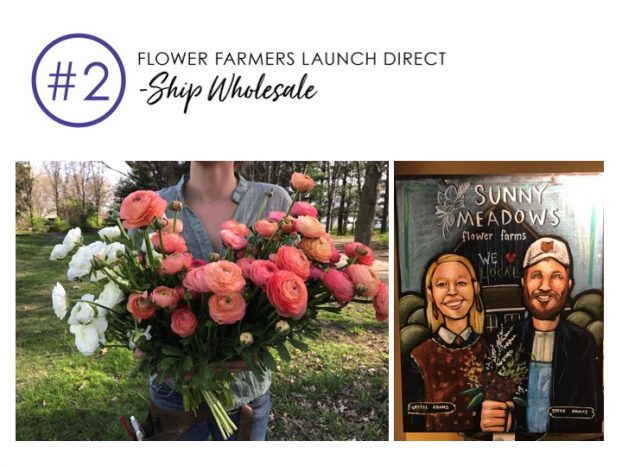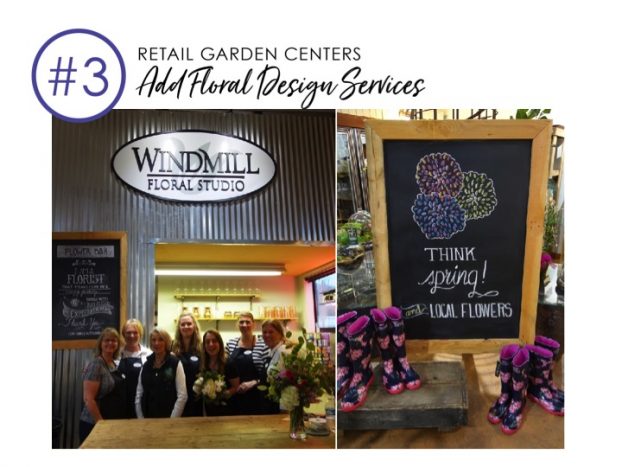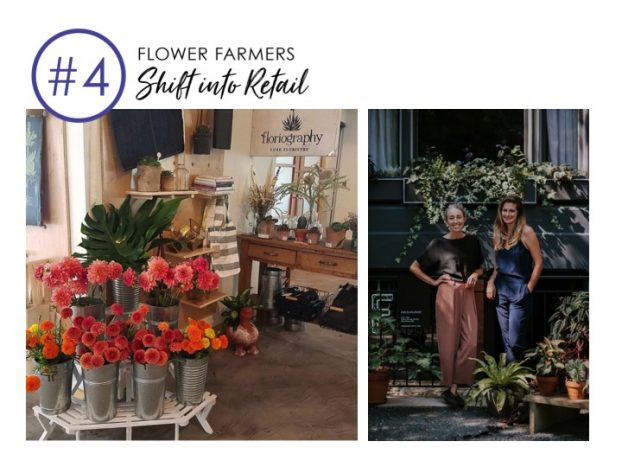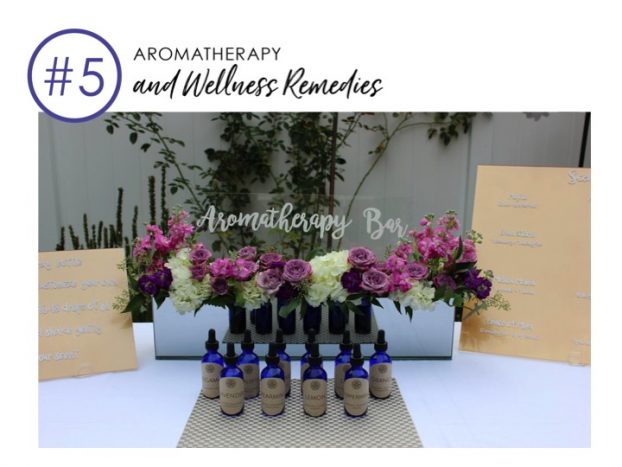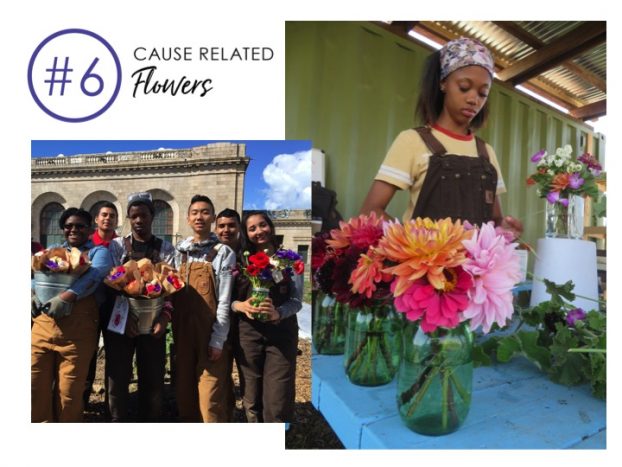Podcast: Play in new window | Download
Subscribe: Apple Podcasts | Podcast Index | RSS | More
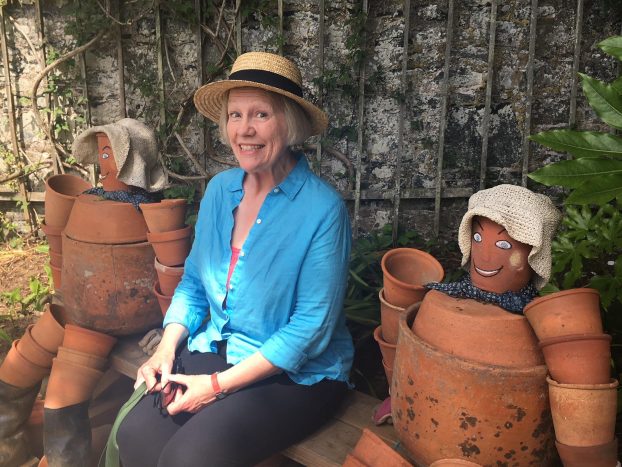
If you’re listening on this episode’s release day — May 22nd — I’m coming to you from London, where I have traveled to attend the RHS Chelsea Flower Show and report for Florists’ Review and its sister publication. This incredible trip would never have happened without a surprise birthday gift from my husband Bruce Brooks, who completely floored me with a dream experience.
So of course, I wanted to season today’s episode with all things British. Our guest is my dear friend Marty Wingate and I’m so excited to introduce you to her as she shares her journey — from successful garden writer to even more successful mystery writer. All of Marty’s titles are traditional mysteries that take place against her favorite British gardens, landscapes, estates and historic manor houses as backdrops. Her mystery-solving female protagonists are curious, clever and courageous, even when they get themselves into tricky situations that require their amateur sleuthing skills.
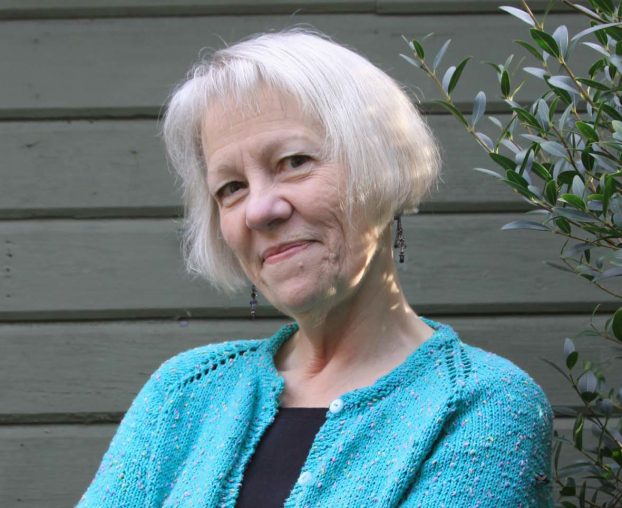
Here’s more about Marty — excerpted from a 2017 profile I wrote about her for the Garden Writers Association’s membership publication.
Armed with a Master’s in Urban Horticulture from the University of Washington, not to mention being a bonafide King County (Washington) Master Gardener and a Seattle gardening personality who for years wrote a weekly newspaper column and appeared on the local NPR radio station, Marty Wingate knows how to diagnose dead plants.
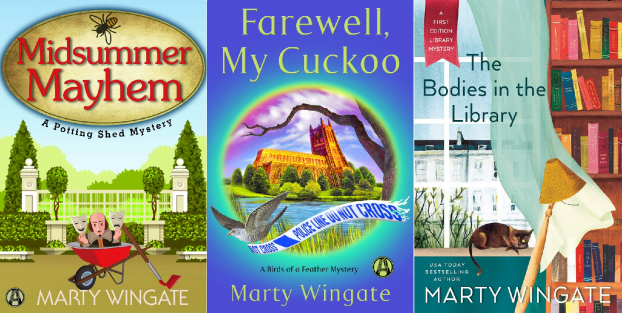
And now, after penning more than 10 murder mysteries and being named a USA Today Bestselling Author, you could say Marty also solves mysteries about dead characters.
The threads connecting these different chapters of her life tie together Marty’s skill for storytelling, her Anglophile tendencies and a love for all things botanical. She leads garden tours to England, Scotland and Ireland and she is a member of the U.K.-based Royal Horticultural Society. In addition to being a longtime member of Garden Writers (now called GardenComm), she is a member of Mystery Writers of America, Sisters in Crime and the Crime Writers Association, the Royal Society for the Protection of Birds and the Royal Horticultural Society.
In 2014, Alibi, a Random House imprint, published The Garden Plot, Marty’s first book in “The Potting Shed” series. The books feature Pru Parke, a middle-aged American gardener transplanted from Texas to England. Murder has a way of finding Pru, wherever she gardens. The seventh title in this series, Midsummer Mayem, was just released November 2018.
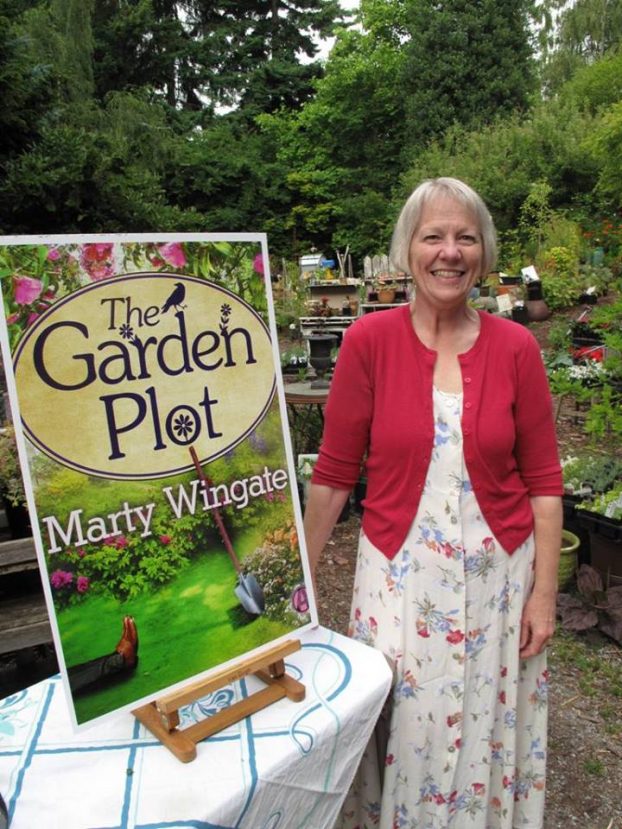
After her stories about Pru were well underway, Marty’s editor suggested she dream up a new protagonist to engage the birding crowd. Julia Lanchester, a bird lover who runs a tourist office in a Suffolk village, was born, part of the “Birds of a Feather” series, with the fourth in the series Farewell, My Cuckoo, also published in 2018. Marty’s books are available on tablets and smart readers, with fans having downloaded more than 120,000 books in just four years.
Marty’s newest series—The First Edition Library (Berkley)—presents Hayley Burke, the curator of a collection of books from the Golden Age of Mystery. The Bodies in the Library, book one, will be released October 1, 2019
How did this popular garden writer, who has authored five garden titles and whose byline continues to appear in Country Gardens, American Gardener and other publications, become a successful mystery writer? So many self-employed garden communicators are interested in diversifying their careers into “crossover” platforms such as culinary, travel, health and wellness or floral (that would be me). And yet, why not fiction?
Marty lives with her husband and two cats near Seattle, her local library standing in for a more colorful writing venue—say, Vita Sackville-West’s tower at Sissinghurst.
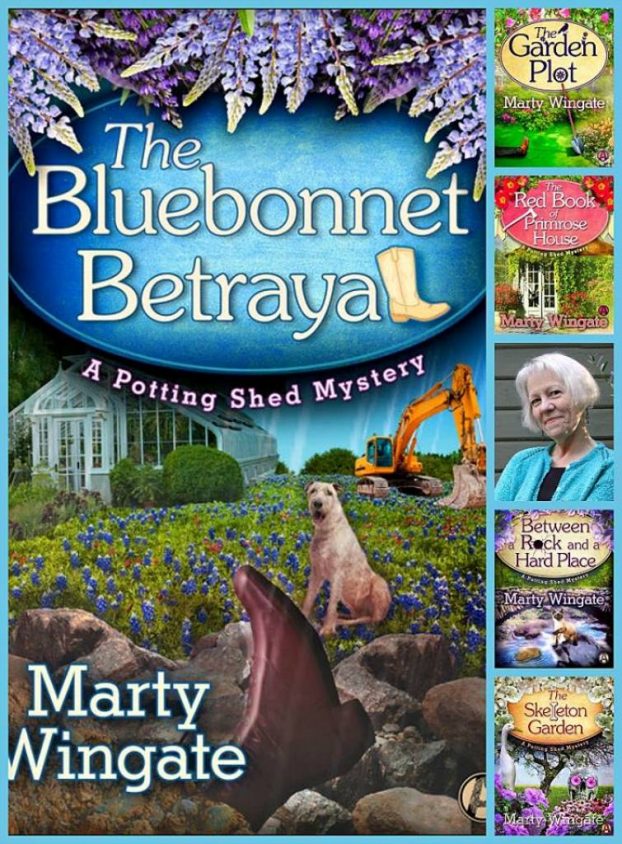
Marty takes research seriously—she is a former how-to garden writer of numerous books and a countless number (at least, she stopped counting ages ago) of magazine and newspaper articles on everything from apple maggot to the prettiest daffodils and the best-smelling roses. Research took on an entirely new light when she began writing mysteries, and now she and her husband travel regularly to England and Scotland, where she plunges deeply into study concerning the next adventure for her protagonists — Hayley, Julia, and Pru—sparing not a few minutes a day to head to the pub.
You can find more about Marty and her books, as well as her other projects including her upcoming garden tour to the Cotswolds in 2020, in today’s show notes for episode 402 at debraprinzing.com. I’ll also share links to her social places.
Learn more about (and follow) Marty Wingate:
Tour the gardens of Cotswolds in 2020 with Marty Wingate
Marty agrees that her horticulture background is an essential part of her narratives. “I love writing about gardens and about plants. I always have correct gardening information. Other than that, I can make up everything else.” I hope you explore her many titles and become as hooked on Marty’s storytelling as I am!
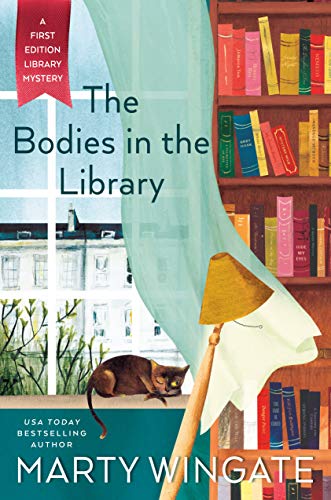
And now, a huge surprise! I have an advanced reader’s copy of Marty’s brand new book — it won’t be out until October — and as soon as I finish reading it, I’ll share it with one lucky listener in a random drawing.
To enter, post your best idea for a garden or floral murder mystery in our comment section by May 31st. We’ll draw a winner on June 1st and announce him or her on June 5th.
And by the way, the winner of this month’s earlier giveaway – of Teresa Sabankaya’s The Posy Book is Heather Coughlin of Pure Bloom Flowers in Long Grove, Illinois. Congratulations, Heather!

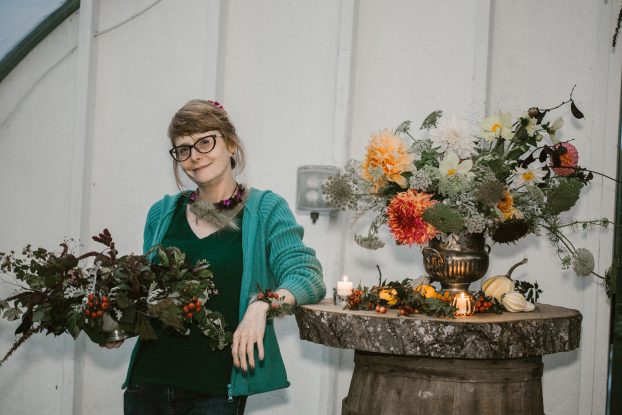
Our theme for 2019 – Fifty States of Slow Flowers – continues today, with floral designer Rayne Grace Hoke of Flora’s Muse, based in Biddeford, Maine.
She writes: “I’m enamored with the beauty of nature and I love the thrilling mix of magic and science. The graceful weight of a tulip in the hand and the intoxicating aroma of mimosa brings pure joy and a bit of awe. It’s these nuances of the natural world which fascinate me. And soaking in these experiences is for me a point of divine expression and inspiration.
“And I’m so grateful my floral path has allowed so many opportunities to explore other artistic curiosities beyond flowers. In the 1990’s, I interned at the Textile Conservation Lab at the Isabella Stewart Gardner Museum.
Additionally, I’m an Ambassador and graduate of the Beyond Startup and New Ventures business program. Via this inspiring organization, I advocate for small women-owned businesses on state and federal levels. But I’ve also tapped into weaving, perfumery, fashion design and even metalsmithing and currently I’m offering Slow Flower-inspired workshops in Maine!”
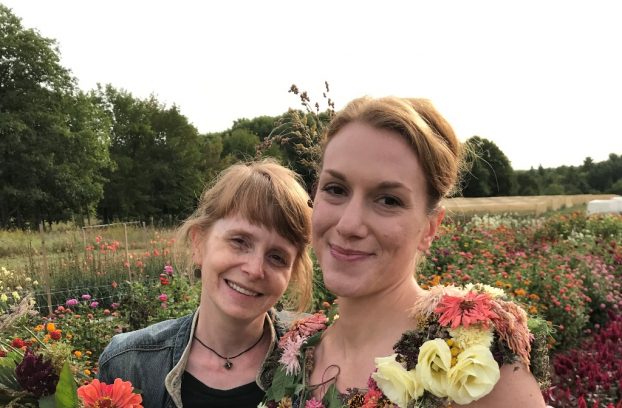
Download a PDF of my Florists’ Review March 2019 article about Rayne Grace Hoke of Flora’s Muse, and a Maine floral design workshop she produced last year with Laura Tibbetts of WestWind Florals.
Find and follow Flora’s Muse on Instagram
Check out the upcoming Slow Flowers Maine Meet-Up, scheduled for June 3rd & 4th — there is time to attend!
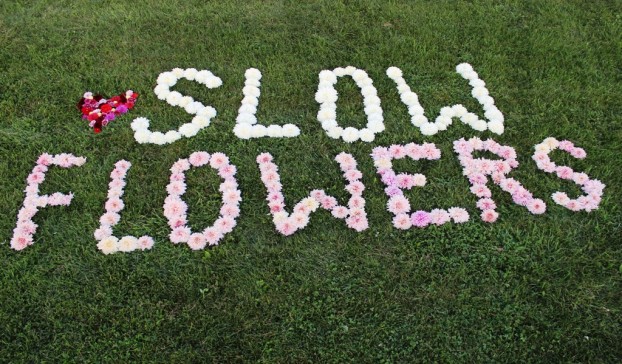

I am so grateful to you for joining me and for spending your time listening to the Slow Flowers Podcast today. Thank you to our entire community of flower farmers and floral designers who together define the Slow Flowers Movement.
Earlier this month, our core member benefit — the slow flowers online directory — turned five years old! This is a major milestone and I can’t tell you how excited I am to see our cause gain more supporters and more passionate participants who believe in the importance of the American cut flower industry.
As I often say, and as you heard in my conversation with Rayne Grace Hoke of Maine, the momentum is contagious. I know you feel it, too. I value your support and invite you to show your thanks and with a donation to support my ongoing advocacy, education and outreach activities. You can find the donate button in the column to the right.
Thank you, sponsors!
Florists’ Review magazine. I’m delighted to serve as Contributing Editor for Slow Flowers Journal, found in the pages of Florists’ Review. It’s the leading trade magazine in the floral industry and the only independent periodical for the retail, wholesale and supplier market. Take advantage of the special subscription offer for members of the Slow Flowers Community.
Syndicate Sales, an American manufacturer of vases and accessories for the professional florist. Look for the American Flag Icon to find Syndicate’s USA-made products and join the Syndicate Stars loyalty program at syndicatesales.com. We are so excited that Syndicate has joined the Slow Flowers Summit as a sponsor — and if you attend, you’ll be heading home with some fun Syndicate USA-made swag!
Seattle Wholesale Growers Market, a farmer-owned cooperative committed to providing the very best the Pacific Northwest has to offer in cut flowers, foliage and plants. The Growers Market’s mission is to foster a vibrant marketplace that sustains local flower farms and provides top-quality products and service to the local floral industry. Visit them at seattlewholesalegrowersmarket.com
NW Green Panels designs and constructs a wide array of wood-framed greenhouses offering versatility, style and durability. Their greenhouses are 100% Oregon-made using twin-wall polycarbonate manufactured in Wisconsin, making NW Green Panel structures a great value for your backyard. The 8×8 foot Modern Slant greenhouse has become the essential hub of my cutting garden — check out photos of my greenhouse or visit nwgreenpanels.com.

I am so excited about the upcoming SLOW FLOWERS SUMMIT and I hope you can join ME and our vibrant and engaging lineup of presenters on July 1st and 2nd in St. Paul, Minnesota. One of the top reasons our attendees love the Slow Flowers Summit is the opportunity to mix-and-mingle with other kindred spirits.
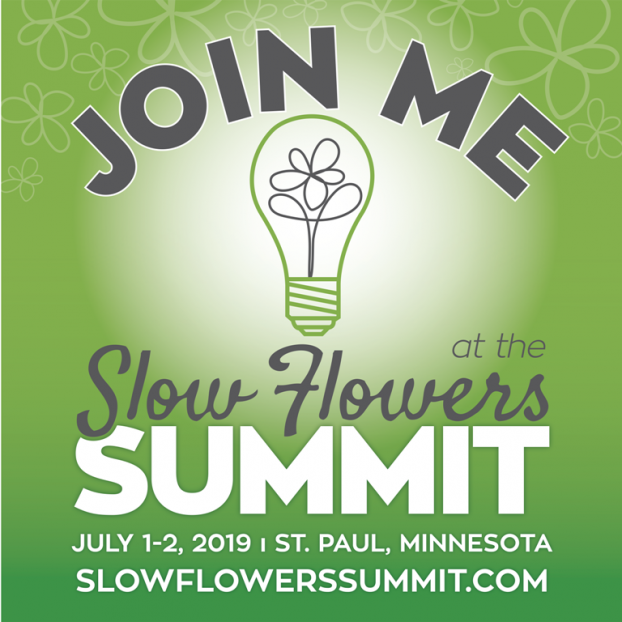
For a limited time — through the end of May — when you register for the Slow Flowers Summit, you can add a guest for $275! This applies to anyone who has already registered, as well as new ticket-buyers. You can find the Plus One promo option by following the Register link at slowflowerssummit.com.

The Slow Flowers Podcast has been downloaded more than 467,000 times by listeners like you. Thank you for listening, commenting and sharing – it means so much.
I’m Debra Prinzing, host and producer of the Slow Flowers Podcast. Next week, you’re invited to join me in putting more American grown flowers on the table, one vase at a time. And If you like what you hear, please consider logging onto iTunes and posting a listener review.
The content and opinions expressed here are either mine alone or those of my guests alone, independent of any podcast sponsor or other person, company or organization. The Slow Flowers Podcast is engineered and edited by Andrew Brenlan. Learn more about his work at soundbodymovement.com.
Music Credits:
Our Son the Potter; Rabbit Hole; Betty Dear; Gaena; Perspiration
by Blue Dot Sessions
http://www.sessions.bluehttps://creativecommons.org/licenses/by-nc/4.0/
Lovely by Tryad http://tryad.bandcamp.com/album/instrumentals
http://creativecommons.org/licenses/by-sa/3.0/
In The Field
Music from:
audionautix.com









